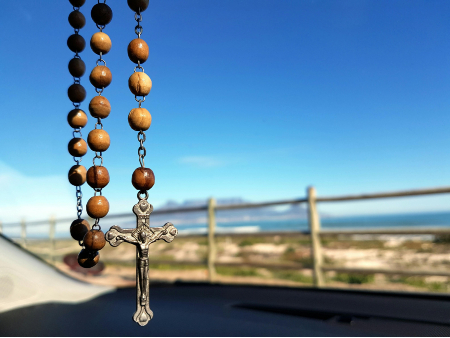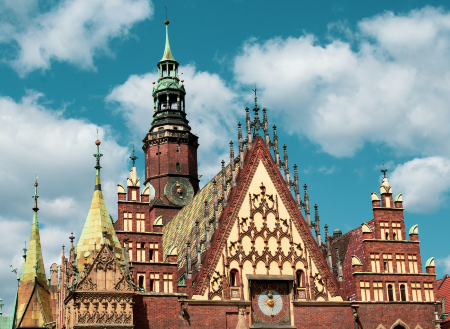We ask you, humbly: don't scroll away.
Hi readers, it seems you use Catholic Online a lot; that's great! It's a little awkward to ask, but we need your help. If you have already donated, we sincerely thank you. We're not salespeople, but we depend on donations averaging $14.76 and fewer than 1% of readers give. If you donate just $5.00, the price of your coffee, Catholic Online School could keep thriving. Thank you.Help Now >
Philosophy Behind Papal 'Deus Caritas Est'
FREE Catholic Classes
Interview With Catholic University's Monsignor Sokolowski
WASHINGTON, D.C., FEB. 16, 2006 (Zenit) - The theology found in Benedict XVI's encyclical "Deus Caritas Est" draws on and blends with philosophical distinctions of love, and raises questions concerning social and political philosophy and anthropology.
So says Monsignor Robert Sokolowski, a professor of philosophy at the Catholic University of America and author of "Christian Faith and Human Understanding" from CUA Press.
He shared with us how the two parts of the encyclical engage philosophy in different ways, and how philosophy plays a role in theological reflection.
Q: What distinctly philosophical concepts has the Pope incorporated into his first encyclical, "Deus Caritas Est"?
Monsignor Sokolowski: Philosophy does have a role in the document; at one point in the encyclical the Holy Father speaks of his "somewhat philosophical reflections," and he also speaks about a "philosophical dimension" in the biblical vision of love.
The encyclical has two major sections. The first deals with the understanding of the place of love in creation and salvation history. The second deals with the practice of charity in the life of the Church.
In the first section, the Pope surveys a number of ways in which the word "love" is used. He examines contemporary usage, discusses the difference between "eros" and "agape" in Greek thought and in the Bible, and examines Hebrew words for love. He also discusses the difference between justice and love.
Most of this first section is theological: The Holy Father examines the Old Testament revelation of the love of God for his creation and his people, and the deepening of this revelation in the Incarnation and the New Testament.
The theology, however, draws on and blends with the philosophical distinctions one can make concerning human love as it is manifest to human reason, especially the difference between self-centered and benevolent love.
Some of our love is needful and possessive; we love what we need and want. This kind of love was called "amor concupiscentiae" in medieval thought.
But as we exercise our human rationality more deeply, we become capable of a benevolent and thoughtful kind of love, in which we go beyond our own needs and wants and love what is good for others and not just ourselves. We do so through the virtues of justice and friendship. This kind of love was called "amor benevolentiae."
These two Latin terms are used in the encyclical. The discussion of the difference between justice and love is also an important philosophical theme.
In the second section of the encyclical, which discusses the practical exercise of love in the Church, the Holy Father reminds us that active charity is essential to the Church: "The Church cannot neglect the service of charity any more than she can neglect the Sacraments and the Word." This is a strong statement.
In this section, several philosophical issues are raised: What is justice? How is justice related to charity? How are reason, the common good and natural law related to one another, and how is the Church able to clarify them?
As you know, in the 19th century both Auguste Comte and John Stuart Mill, in the wake of the Enlightenment and the French Revolution, wished to replace Christian faith and charity with the religion and love of humanity. Many of the charitable works of the Church were taken over by the state.
The Pope shows in the encyclical that this desire to imitate Christian religion and charity was already found in Julian the Apostate in the fourth century.
A major problem arises in the modern age when the state tries to take over all "charitable" works, because it might then try to govern the souls and minds of people as well; totalitarian regimes did not stop with bodily needs.
The Pope raises the question of how the Church is to carry out her essential work of charity in an age of technology and massive governmental activities. Will she become an agent of the government or exercise an independent role? How is this role to be defined? These questions engage social and political philosophy as well as philosophical anthropology.
 Hi readers, it seems you use Catholic Online a lot; that's great! It's a little awkward to ask, but we need your help. If you have already donated, we sincerely thank you. We're not salespeople, but we depend on donations averaging $14.76 and fewer than 1% of readers give. If you donate just $5.00, the price of your coffee, Catholic Online School could keep thriving. Thank you. Help Now >
Hi readers, it seems you use Catholic Online a lot; that's great! It's a little awkward to ask, but we need your help. If you have already donated, we sincerely thank you. We're not salespeople, but we depend on donations averaging $14.76 and fewer than 1% of readers give. If you donate just $5.00, the price of your coffee, Catholic Online School could keep thriving. Thank you. Help Now >
Q: Why did Benedict XVI mention the philosophers Descartes and Nietzsche in an encyclical about love, both human and divine?
Monsignor Sokolowski: He also mentions Plato and Aristotle later in the encyclical.
Descartes is alluded to only in an anecdote, but Nietzsche is mentioned right at the beginning, as saying that Christianity has poisoned "eros." He is mentioned here to provide the counter-position to what the Pope wishes to show -- that Christianity does not neglect the deepest wants and needs of human beings.
The love that God reveals to us is not gnostic; it reaches into, heals and elevates all our desires, including those involved in sustenance and procreation.
The Pope uses Nietzsche in the way that St. Thomas Aquinas uses adversaries at the beginning of his treatment of a question: He presents the opposing view fairly as the sharp contrast to what he wants to show. Nietzsche is fundamentally unsound, of course, but he raises very good questions and is always a good foil for philosophical reflection.
Q: Does Benedict XVI adhere to a particular philosophical tradition in the way the Pope John Paul II was known as a Thomist and personalist?
Monsignor Sokolowski: I think that the work of Benedict XVI could be said to resemble the Christian Platonism one finds in the Fathers of the Church.
Also, his extensive and thoughtful survey of the various uses of words, in both current and historical texts and discourse, makes one think of Aristotle's and Heidegger's way of looking for philosophical phenomena in the way people speak about things.
Q: John Paul II's encyclicals were notable because of their strong philosophical foundation, which reflected his training. How does Benedict XVI's "Deus Caritas Est" compare in this regard?
Monsignor Sokolowski: Pope John Paul II was not only a philosopher but also an actor, and I think his sense for the dramatic is evident in his encyclicals. In "Veritatis Splendor," for example, the image of the rich young man gives a vivid and concrete focus to the document.
Benedict XVI's encyclical is less dramatic but very comprehensive, and it is particularly strong in its survey of the nuances of language in different contexts.
He emphasizes the continuity between human experience and divine revelation; he shows that God's word and love complete our human nature, but also go beyond it in ways that we could not have anticipated by our natural abilities alone.
Q: Philosophers have long noted that God is many things, particularly being, truth, beauty, goodness, and unity or oneness. What is the typical reaction of a philosopher upon hearing that "God is love"? How might a philosopher understand this concept?
Monsignor Sokolowski: It would be hard to say that "God is love" apart from the doctrine of the Holy Trinity. Even if one were to think that the deity is benevolent, one could still not say that it is love. That sort of divine love would be relative and not substantial in the deity.
Only because the Father gives everything to the Son, and because the Son and Father express their love in the Holy Spirit, can one say, with St. John, that God is love. I don't see how such an understanding of God could have arisen in philosophical thinking.
Q: What role does philosophy play in theological reflection?
Monsignor Sokolowski: It could be considered analogous to the role that mathematics plays in physics. Philosophy tries to arrive at truths that could not be otherwise -- truths that define the boundaries of things and the whole of things.
Theology based on Christian revelation introduces a revision of the whole of things: God is revealed and "understood" in a deeper way, the world is understood differently, and so are we. The ultimate truths that philosophy reaches are then seen in a new context, but their natural truth is not diluted or destroyed.
For example, one might reflect philosophically on what human choice and responsibility are. But these truths become more profoundly understood when we come to know, through faith, that we must make choices and take up responsibilities not just toward one another but toward the God who has spoken and acted toward us in Christ.
Q: Where does love fit into the philosophical discipline of natural theology, or any other area of philosophy where the question of God is addressed?
Monsignor Sokolowski: Love has been a theme in philosophy from the beginning; think of the role it has in Plato's dialogues. When Aristotle speaks about human happiness, he discusses various ways in which we desire and wish for things. Even the theoretic life is a good for us that we can love. Lucretius begins "De Rerum Natura" with a hymn to "alma Venus," who pervades and governs everything. Philosophy gets to ultimates and the good is among them, so our response to the good -- love -- is among the ultimates as well.
How far does this love reach? Is the love in human friendship its highest form? We can contemplate the universe but it seems inappropriate to say that we can love it. But if there is a first principle in the universe, and if it somehow knows us and is benevolent toward us, then a new kind of loving is not only fitting but somehow enjoined on us; we would be remiss and ungrateful if we failed in it.
But if we come to know that this first principle not only knows, loves and hears us, but also chose us to be and redeemed us by becoming one of us, then we would see that we could never respond to him properly by our own efforts; we could respond only through his grace and by sharing in his own love. This would be our participation in the life of the Holy Trinity, the gift of the Incarnation.
Contact
Catholic Online
https://www.catholic.org
CA, US
Catholic Online - Publisher, 661 869-1000
info@yourcatholicvoice.org
Keywords
Pope, Benedict, Deus Caritas Est, Sokolowski
More Catholic PRWire
Showing 1 - 50 of 4,716
A Recession Antidote
Randy Hain
Monaco & The Vatican: Monaco's Grace Kelly Exhibit to Rome--A Review of Monegasque-Holy See Diplomatic History
Dna. Maria St. Catherine Sharpe, t.o.s.m., T.O.SS.T.
The Why of Jesus' Death: A Pauline Perspective
Jerom Paul
A Royal Betrayal: Catholic Monaco Liberalizes Abortion
Dna. Maria St.Catherine De Grace Sharpe, t.o.s.m., T.O.SS.T.
Embrace every moment as sacred time
Mary Regina Morrell
My Dad
JoMarie Grinkiewicz
Letting go is simple wisdom with divine potential
Mary Regina Morrell
Father Lombardi's Address on Catholic Media
Catholic Online
Pope's Words to Pontifical Latin American College
Catholic Online
Prelate: Genetics Needs a Conscience
Catholic Online
State Aid for Catholic Schools: Help or Hindrance?
Catholic Online
Scorsese Planning Movie on Japanese Martyrs
Catholic Online
2 Nuns Kidnapped in Kenya Set Free
Catholic Online
Holy See-Israel Negotiation Moves Forward
Catholic Online
Franchising to Evangelize
Catholic Online
Catholics Decry Anti-Christianity in Israel
Catholic Online
Pope and Gordon Brown Meet About Development Aid
Catholic Online
Pontiff Backs Latin America's Continental Mission
Catholic Online
Cardinal Warns Against Anti-Catholic Education
Catholic Online
Full Circle
Robert Gieb
We ask you, humbly: don't scroll away.
Hi readers, it seems you use Catholic Online a lot; that's great! It's a little awkward to ask, but we need your help. If you have already donated, we sincerely thank you. We're not salespeople, but we depend on donations averaging $14.76 and fewer than 1% of readers give. If you donate just $5.00, the price of your coffee, Catholic Online School could keep thriving. Thank you.Help Now >
Three words to a deeper faith
Paul Sposite
Relections for Lent 2009
chris anthony
Wisdom lies beyond the surface of life
Mary Regina Morrell
World Food Program Director on Lent
Catholic Online
Moral Clarity
DAN SHEA
Pope's Lenten Message for 2009
Catholic Online
A Prayer for Monaco: Remembering the Faith Legacy of Prince Rainier III & Princess Grace and Contemplating the Moral Challenges of Prince Albert II
Dna. Maria St. Catherine Sharpe
Keeping a Lid on Permissiveness
Sally Connolly
Glimpse of Me
Sarah Reinhard
The 3 stages of life
Michele Szekely
Sex and the Married Woman
Cheryl Dickow
A Catholic Woman Returns to the Church
Cheryl Dickow
Modernity & Morality
Dan Shea
Just a Minute
Sarah Reinhard
Catholic identity ... triumphant reemergence!
Hugh McNichol
Edging God Out
Paul Sposite
Burying a St. Joseph Statue
Cheryl Dickow
George Bush Speaks on Papal Visit
Catholic Online
Sometimes moving forward means moving the canoe
Mary Regina Morrell
Action Changes Things: Teaching our Kids about Community Service
Lisa Hendey
Easter... A Way of Life
Paul Spoisite
Papal initiative...peace and harmony!
Hugh McNichol
Proclaim the mysteries of the Resurrection!
Hugh McNichol
Jerusalem Patriarch's Easter Message
Catholic Online
Good Friday Sermon of Father Cantalamessa
Catholic Online
Papal Address at the End of the Way of the Cross
Catholic Online
Cardinal Zen's Meditations for Via Crucis
Catholic Online
Interview With Vatican Aide on Jewish-Catholic Relations
Catholic Online
Pope Benedict XVI On the Easter Triduum
Catholic Online
Holy Saturday...anticipation!
Hugh McNichol












 Daily Readings for Wednesday, April 17, 2024
Daily Readings for Wednesday, April 17, 2024 St. Anicetus: Saint of the Day for Wednesday, April 17, 2024
St. Anicetus: Saint of the Day for Wednesday, April 17, 2024 Prayer to Love God above all Things: Prayer of the Day for Wednesday, April 17, 2024
Prayer to Love God above all Things: Prayer of the Day for Wednesday, April 17, 2024
